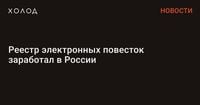In Russia, the automated notification system for conscription has transitioned from test mode to full operation, marking a significant change in how citizens interact with military registration offices. The official website, known as the Register of Summons of the Russian Federation, has begun functioning fully after several months of limited testing in select regions.
The service, previously operational only in the Ryazan region, the Republic of Mari El, and Sakhalin, is now available to all citizens of Russia, as reported by the human rights movement "Go by the Forest," which assists individuals in evading conscription into the Russian army. The main difference from the test mode is the removal of the pilot launch note, allowing full functionality for all users.
Citizens can now log into their personal accounts, check for any summons issued in their name, and receive an official excerpt from the register. The portal offers two options for access: one for individuals and another for organizations. This means that visitors can find out if a summons has been issued for them without needing to visit the military enlistment office in person.
Some users have already tested the system's functionality, with screenshots of received excerpts dated May 8, 2025, surfacing online. These documents display personal information, including the individual's full name, date of birth, and SNILS number, along with details about whether there are any records in the register.
The history of the electronic register's development traces back to April 2023 when Russian President Vladimir Putin signed a law equating electronic summons with paper ones. This legislation introduced restrictions for those evading their required appearance at military registration offices. Initial mentions of the system's operational status emerged in February 2025, when screenshots of the register's interface were submitted in a Moscow court during a case concerning a fine for failing to appear in response to an electronic summons.
On April 11, 2024, Andrey Krasov, the first deputy chairman of the Duma Committee on Defense, confirmed that the technical aspects of the system were fully debugged and that it was functioning in test mode in several regions at that time. According to the legislation, the register maintains comprehensive data on individuals liable for military service, including their places of residence, work, studies, and information from various government agencies such as the tax service and medical organizations.
A key feature of the new system is the automatic registration of summons, which will be sent through the Gosuslugi portal. Importantly, a notification regarding an appearance at the military enlistment office is considered served seven days after it is sent, regardless of whether the individual has opened the message.
Citizens of conscription age are particularly alarmed by the provision that prohibits leaving Russia for those who receive a summons through the system. Under the new regulations, once an electronic summons is deemed received, the individual is automatically barred from leaving the country until they report to the military enlistment office.
The full launch of the summons register signifies a new phase in the digitalization of processes related to military registration and conscription. The system aims to streamline the notification process and reduce the number of individuals evading their conscription duties. However, as human rights activists have pointed out, it also introduces additional risks and restrictions for citizens.
Lawyers are advising those liable for military service to regularly check their status in the electronic register and to pay attention to notifications received through the Gosuslugi portal. Ignoring these notifications could lead to serious legal consequences, including fines and restrictions on movement.
In addition to the operational updates, the "Go by the Forest" project emphasized that the notification about the test mode, which was previously indicated on the website, is now absent. This suggests that the site has fully transitioned to operational status. Users are encouraged to enter their personal accounts, check for summons, and obtain necessary extracts.
Despite the system's rollout, some issues remain. As reported by "Kholod," the section for citizens is currently experiencing problems, with pages either failing to load or displaying errors. However, the section for organizations is functioning normally. Access to the portal requires specific Russian browsers, such as Yandex or Chromium GOST, along with the KriptoPro application and its browser plug-in.
So far, there have been no reports from individuals who received summons through this site or experienced automatic restrictions. Earlier, it was noted that to ensure secure connections, users must install Russian security certificates, which raises concerns about potential access to personal data by the state or fraudsters.
In February 2025, the human rights organization "School of the Conscript" noted that the Moscow military registration office had effectively confirmed the register's functionality. A court ruling upheld a fine imposed on a resident for failing to respond to an electronic summons, further solidifying the legal standing of the new system.
The "Go by the Forest" movement has also pointed out that as of May 8, 2025, users can now request two types of extracts from the Register of Summons: one for sent (served) summons and another from the Register of Military Registration. When extracts from both registers were compared, they were found to be identical, differing only in the abbreviations indicating the type of register.
The extracts contained a "period of formation of the extract" starting from September 15, 2024, indicating that both registers have been collecting current data on individuals liable for military service since that date. The launch of the register was initially planned for November 1, 2024, but there has been no official confirmation of its operation until now.
As the Register of Summons becomes fully operational, it raises questions about the implications for citizens and their rights. While the intent is to create a more efficient conscription process, the potential for increased surveillance and restrictions on freedom of movement cannot be overlooked.




